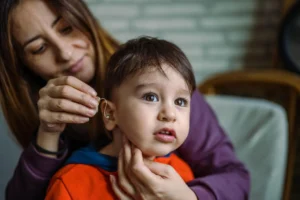Last Updated on 2 years ago by Nicky Johnson
You have a dream for your child. You want them to grow up to be strong, intelligent individuals who face life’s challenges and thrive. Children learn and develop at different rates, but you should be aware of any delayed or slowed development.
If your child is exhibiting slow or challenging development they may have a disability.
Signs of Early Disability
Some disabilities are easily recognizable such as physical impairments. However, a learning disability has other signals. If you notice some of the following in your children, you should consult your doctor or pediatrician.
- Delayed Speech
- Pronunciation Problems
- Difficulty learning new words
- Poor Grasp of a crayon or pen
- Trouble with buttoning, zipping, and tying
Almost all children at one time or another struggle with learning. If you notice these or other warning signs, they are not in and of themselves sufficient evidence. You should contact your healthcare provider and ask for a referral for testing and diagnosis.
In the event of a positive diagnosis search out a therapy provider who adheres to an early childhood approach.
There are things you can do to maintain your sanity and assist your child in their development. Creating quality time with your family is important.
Following a schedule is important to provide stability for your children. This is particularly important for a child with a disability. Doing the same things at the same time every day, when at all possible, instills predictability and helps children to know what to expect.
Plan your outings. When taking your children with you on errands, think about going to your destination at nonpeak hours. Fewer people means less confusion for your child to deal with.
Give yourself extra time. If you get rushed or hassled, that communicates easily to your children, and they are likely to dramatize right along with you. Know that things are going to take longer with a disabled child, and give yourself the time you need.
Fun activities. Take a walk in the woods, go to the beach, or picnic in the park. Give yourself and your children some space. Let them run around and burn off some of their excess energy. This helps you relax and unwind and provides exercise and a connection to nature that all kids enjoy.
Bring help if necessary. When taking your disabled child out, it helps to have an extra pair of hands. An older sibling can be of great assistance when you are out and about.
How Common Are Learning Disabilities?
In Australia, it is estimated that 4% of children suffer from a learning disability. Another 6%-12% are thought to have difficulties related to learning that go beyond what Is normally offered by a classroom teacher.
These are students who could be classified as just needing some more help or assistance. This is borne out by the Australian Department of Health and Welfare.
It’s important to remember that you are not alone. Your family is with you and other resources can help you cope with raising a child with a learning disability.







